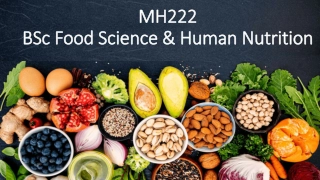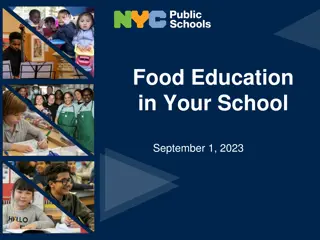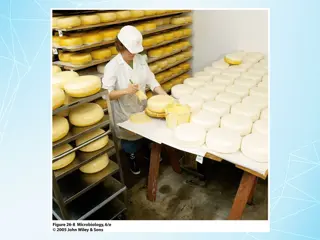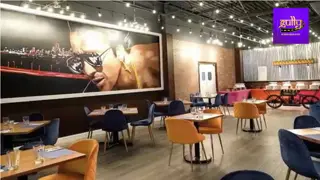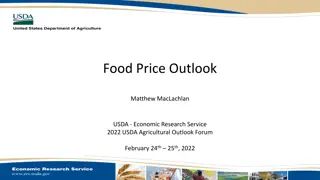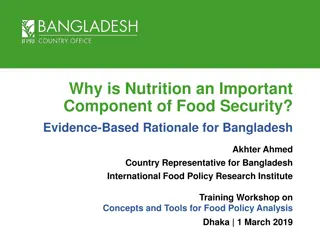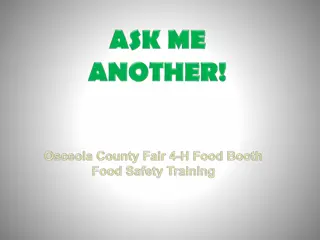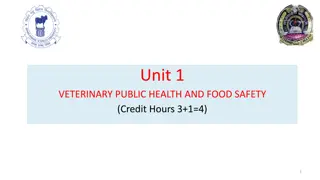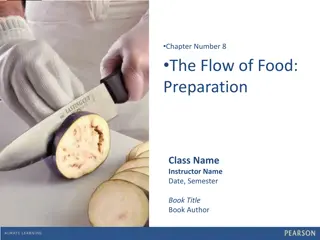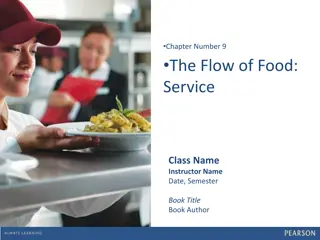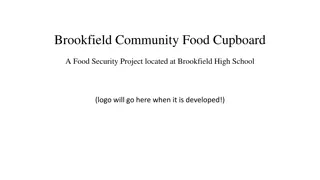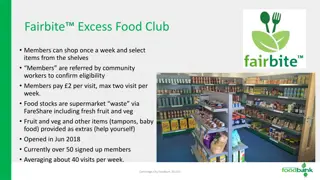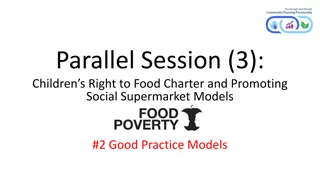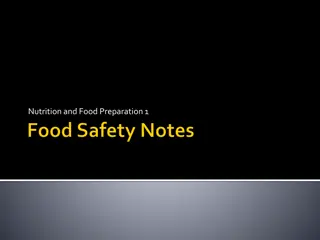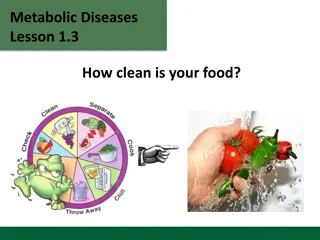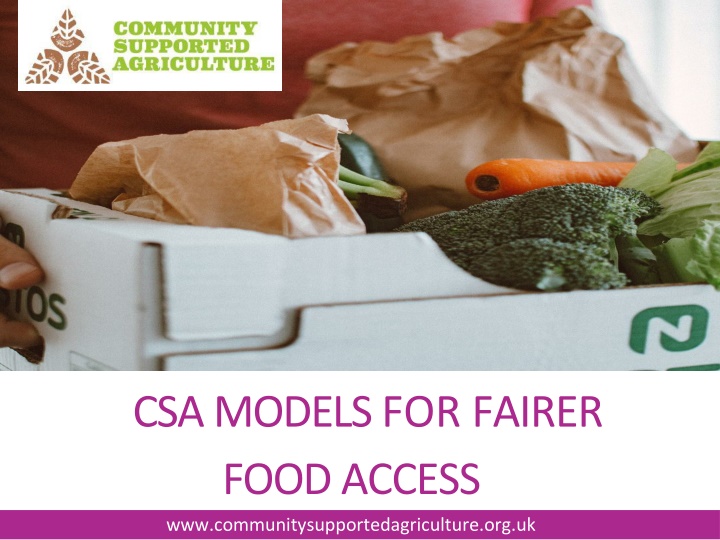
Innovative Solutions for Fairer Food Access Through Community Supported Agriculture
Explore the barriers marginalized groups face in accessing Community Supported Agriculture (CSA) and discover innovative solutions to increase accessibility. Address economic, sociocultural, and physical barriers to promote diversity and inclusivity. Join the movement towards a more equitable and sustainable food system.
Download Presentation

Please find below an Image/Link to download the presentation.
The content on the website is provided AS IS for your information and personal use only. It may not be sold, licensed, or shared on other websites without obtaining consent from the author. If you encounter any issues during the download, it is possible that the publisher has removed the file from their server.
You are allowed to download the files provided on this website for personal or commercial use, subject to the condition that they are used lawfully. All files are the property of their respective owners.
The content on the website is provided AS IS for your information and personal use only. It may not be sold, licensed, or shared on other websites without obtaining consent from the author.
E N D
Presentation Transcript
CSAMODELSFOR FAIRER FOODACCESS www.communitysupportedagriculture.org.uk
Starting Point Reduction in accessibility of food couped with increasing poverty Food aid explosion Increased take up of CSA shares Non-diverse membership Collective desire to explore this Collective Enquiry New Economics Foundation (NEF), Dee Woods and 12 CSAs Three workshops in Spring 2022 Explore the barriers for people from marginalised groups in accessing CSAs Examine current practices in reducing these barriers Co-create innovative solutions We'vetriedtosharewithothersthatdon'tusuallyaccessthehigh quality, organic,goodfoodwegrow,buthavebeenfaced withmany barriersevento givingoursurplusaway. www.communitysupportedagriculture.org.uk
Locating Ourselves There are a mixture of work and education backgrounds amongst the people that are involved in running our farm, but everyone seems to have financial security. People also have time available to attend meetings and/or do practical work on an unpaid basis. The majority of members are privileged; white, mainly middle class, well educated, able bodied. And then exploring barriers The barriers identified fell into three different themes: Economic, Sociocultural and Physical and Communication. www.communitysupportedagriculture.org.uk
Barriers: Economic Economic barriers clearly exist Traditional CSA model as a barrier Increased administrative costs Lack of resource Competition But potential for change Well paid growers makes food more expensive. Then we are trying to compete with supermarket prices. We work on such a tight budget that providing discounted boxes is hard. We could operate a sliding scale if most members could afford to pay, not if most were on a low income. People do come subtly to say they can't afford - people get fed on site or swap work for food. Some people do use this as a way of getting food. "The premise of pay in advance is exclusionary" From a CSA's perspective, to customise subscriptions increases the admin burden. www.communitysupportedagriculture.org.uk
Barriers: Sociocultural Cooking skills and facilities Perceptions around connection to land and food growing Confidence Culturally appropriate produce Cultural norms and stereotypes Language Racism Presence of other agents Food education is crucial. The share isn't customised to meet the diets of a variety of cultures. Food is just one aspect. Education, community, green jobs, showcasing. For example, changing the way in which landwork is thought about. Racial micro-aggressions at veg pick up, eg a white member/volunteer asking a person of colour how they cook a certain veg in "your cooking", or presuming a person of colour will want extra chillies? Landwork is seen as un-aspirational, backwards, impoverished, risky, slavery. www.communitysupportedagriculture.org.uk
Barriers: Physical and Communication Location Transport Visibility Communication channels Disability If you want to reach people you have to go out to them, they won't come to you. Some people may love to find us but don't know that we're there." "We're in different spaces online Pick up hubs and deliveries can help with transport/physical access limitations. Nowhere to leave veg boxes if people live in flats and are not at home due to their work schedule. I found out that one of members always sends her partner to collect veg because she is a wheelchair user and the amount of effort it would take her to access the farm is too much. www.communitysupportedagriculture.org.uk
Internal Barriers Resources Knowledge Viability I'm overwhelmed by the difficulty of food access. It's not just food, it's also housing and everything. It is a lot of work just growing the food. www.communitysupportedagriculture.org.uk
Responsibility Varied opinions Desire to strengthen movement I think it should be a defining feature of CSA, otherwise it isn't community. There are other organisations doing good stuff. We can't do everything. A constant battle - it is difficult to fix everything to do with the food system and balance this with making a living/having a good standard of life. CSAs as a model for community connection that prioritises our values (equity & respect). Yes, this is our purpose. We could have just sold wholesale, but that's not our motivation. Without making it accessible to everyone then you ve lost before you ve started. www.communitysupportedagriculture.org.uk
Current Practice and Suggestions Economic: Solidarity based Gift box Pay It Forward / Bursaries Bidding Rounds Sliding Scale Wage Equity Model Income based Partnership Pay it forward via a third organisation Grants Vouchers Fundraisers Social Prescribing High Value Diversification Co-operative working www.communitysupportedagriculture.org.uk
Current Practice and Suggestions More Practical: Work shares Flexible Share Offers Food co-ops Surplus distribution And.. Think about diversity on your board, in policy and practice Drop off and pick up Communications Partnership and Outreach Role models Research your community Eat, play and celebrate together Events Recipe and cooking resources Ask about physical and cultural barriers Translation Training on racial, gender and disability equity www.communitysupportedagriculture.org.uk
Final Thoughts Collective responsibility Do what we can Solidarity models Small things create big changes Promote and celebrate our contribution www.communitysupportedagriculture.org.uk
Thank You! www.communitysupportedagriculture.org.uk

